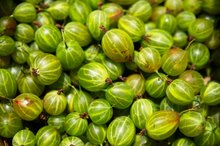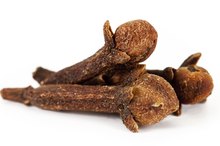The Benefits of Coriander, Ginger and Cumin
Cumin, coriander and ginger may be well known for their spicy properties, but their benefits go beyond adding flavor to food. Traditionally, cumin has been used to suppress muscles spasms, reduce inflammation and aid in digestion. Coriander, also known as dhania in some parts of Europe, contains elements of essential oils, minerals and vitamins that are all important for optimal functioning of your body. And ginger has been used by the Chinese for more than 2,000 years to treat stomach upsets, nausea and diarrhea.
Cumin
According to a study published in “Complementary and Alternative Medicine” in May 2011, cumin was found to be a good source of antioxidants, which help your body fight free radicals. Free radicals are unstable molecules produced during cell metabolism that can cause certain diseases, such as cancer, by tampering with DNA. Antioxidants neutralize the electrical charge that makes these molecules unstable and thereby minimize their harmful effects. Cumin is also a good source of potassium and copper. Potassium helps control blood pressure, while copper is needed by your body for the production of red blood cells.
Coriander
The Health Benefits of Andrographis
Learn More
Coriander contains linoleic and cineole acids, which may help reduce the swelling caused by arthritis and rheumatism. It may be effective as well in reducing swelling caused by anemia or kidney malfunction because it contains components that may stimulate urination and discharge of excess water from the body. Coriander also contains citronelol, which is antiseptic and a component of essential oils. Together with other elements in coriander, it may help prevent ulcers and wounds in the mouth from getting worse.
Ginger
A study published in the “Journal of the Science of Food and Agriculture” in September 2011 indicated that ginger may help in digesting and absorbing fat. The research was done on rats that were fed high amounts of fat. Combined with other spices, ginger was found to activate certain enzymes that stimulate secretion of bile, which assists in the digestion and absorption of lipids. Ginger may also assist in overcoming dizziness and its symptoms, such as nausea.
Precautions
The Health Benefits of the Plantain Leaf
Learn More
Despite the fact that cumin, coriander and ginger may be beneficial to your health in a number of ways, you should use them with caution as they can also cause some health problems. According to MedlinePlus, excessive amounts of ginger may worsen some heart conditions and increase the chances of bleeding. Drugs.com reports that cumin may lower your blood sugar and sensitize your skin to light. And the Organic Facts website cautions that coriander, just like cumin, may also increase skin sensitivity to light, making you vulnerable to sunburn and increasing your chances of developing skin cancer.
Related Articles
References
- Drugs.com: Cumin
- Organic Facts: Health Benefits of Coriander
- University of Maryland Medical Center: Ginger
- Complementary and Alternative Medicine: Antioxidant Potential of Bitter Cumin (Centratherum Anthelminticum (L.) Kuntze) Seeds in In Vitro Models
- National Cancer Institute: Antioxidants and Cancer Prevention: Fact Sheet
- Nutrition and You: Cumin Seeds Nutrition Facts
- Journal of the Science of Food and Agriculture: Fat Digestion and Absorption in Spice-Pretreated Rats
- MedlinePlus: Ginger
Writer Bio
Clark Alena has been a registered dietitian since 1998 and a Certified Lactation Counselor since 2000. Alena specializes in articles related to nutrition during pregnancy and infancy, breastfeeding, nutrition and child care. Alena holds a Ph.D. in Human Nutrition from Colorado State University; Fort Collins, CO.









